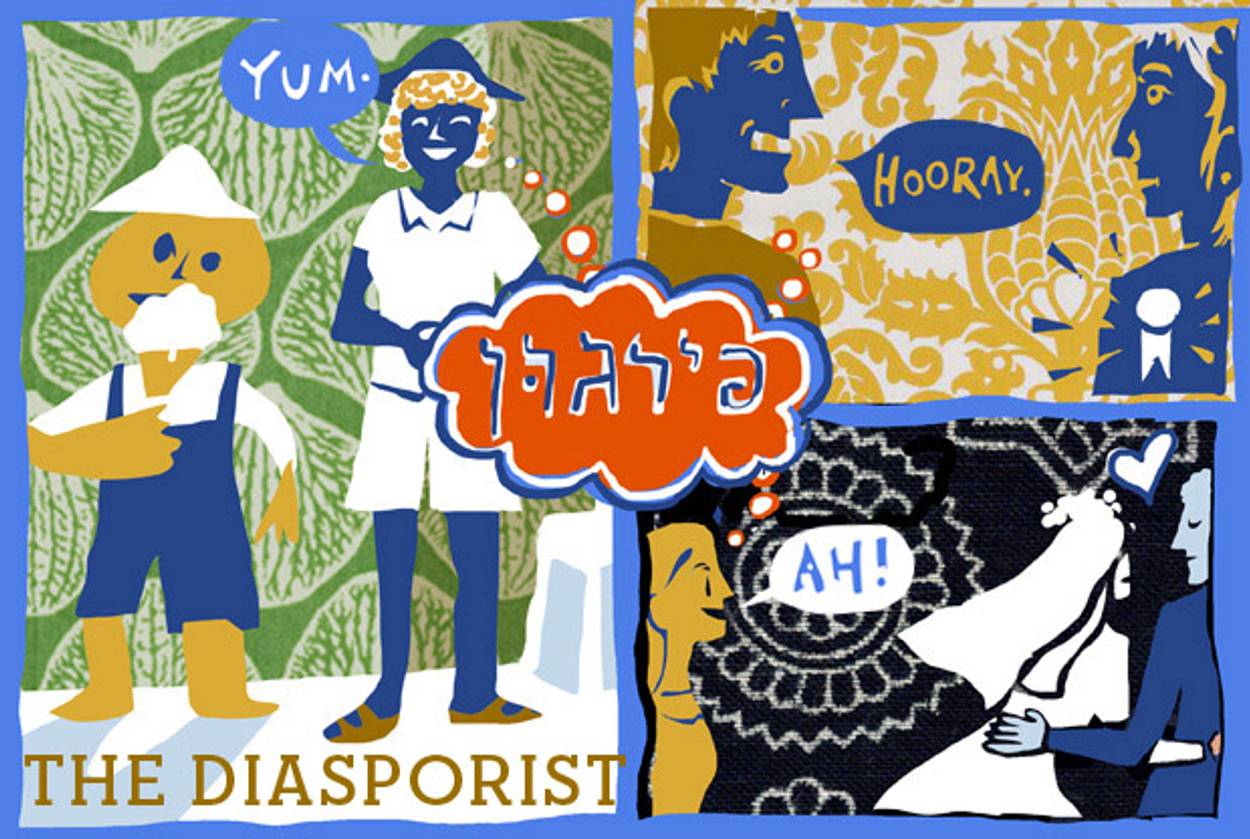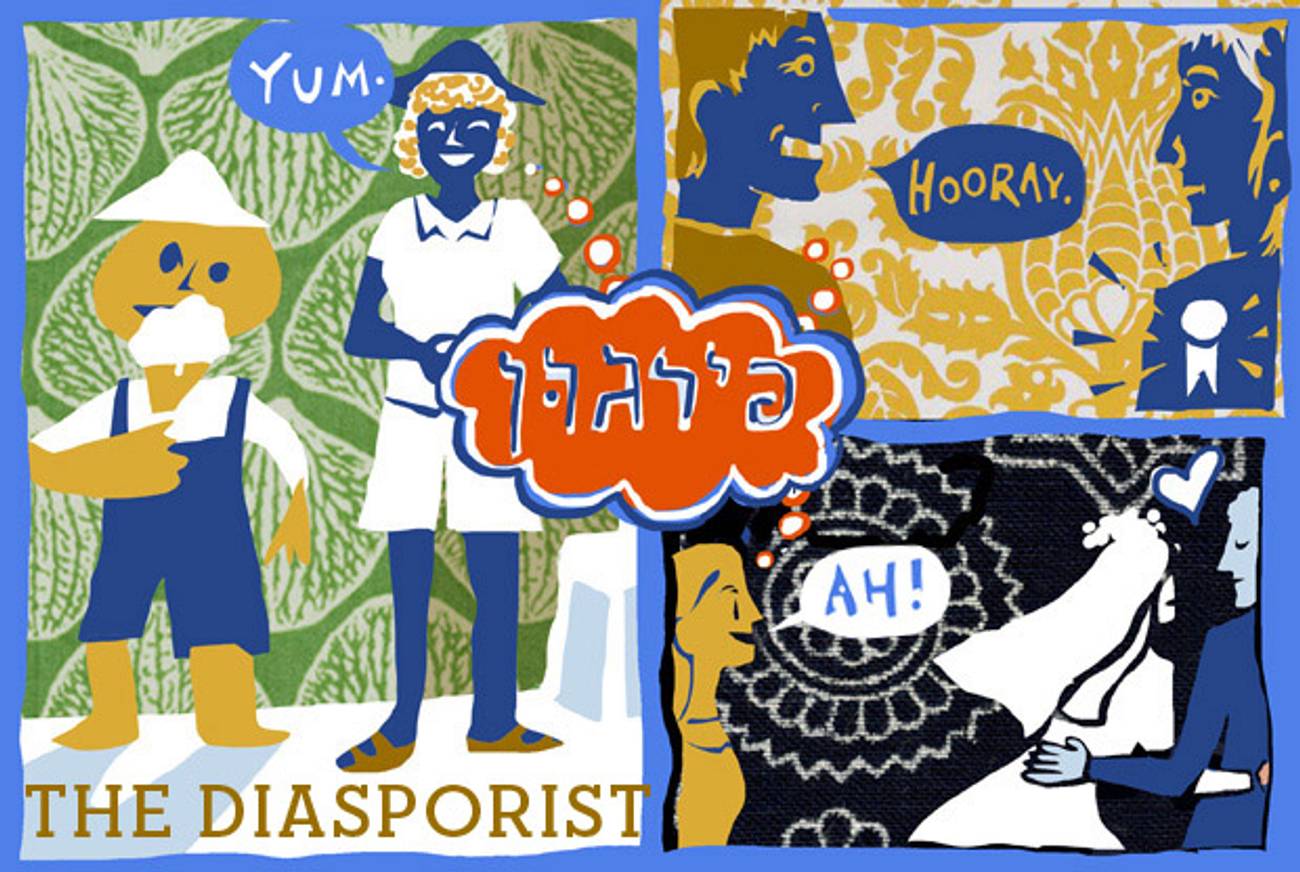Hebrew’s Special Pride
Firgun is the ungrudging pleasure one takes in another’s good fortune, and there’s no English word for it




A few weeks ago, I called Michael Wex, author of Born to Kvetch, wanting to know about the Yiddish origin of the Hebrew word firgun, a word I’d come to translate, incompletely, as the opposite of schadenfreude but that literally translated as “not to begrudge.” Wex’s first reaction was to tell me a joke: An angel appears to a man walking down the street. This is your lucky day, the angel says, you can have anything you want, and in unlimited quantities. The thing is, whatever you get, your neighbor gets twice as much. It’s maddening, thinks the man. And then he has a solution: “I want to lose sight in one eye.”
That’s nisht farginen.
In Yiddish, it turns out, this twice-exiled phrase (thrice if you count the German original, vergonnen) is all about actually begrudging. (An exception, Wex says, is when it’s used reflexively: I fargin myself this chocolate cake even though I’m on a diet.) But that’s not how I understood the term, hearing it in Israel and in an Israeli home. The Hebrew noun is firgun; mefargenet and mefargen are adjectives. It describes a generosity of spirit, an unselfish, empathetic joy that something good has happened, or might happen, to another person. A typical use in my family would be passing on a trip itinerary and getting the maternal reply, “Mefargenet lach, motek.” I’ve got such firgun for you, sweetheart—drawing pleasure from a vacation she won’t take.
I’ve found that English is bereft without an equivalent. “Maybe we ought to import the term into English as Israelis did into Hebrew,” wrote Ruth Wisse, professor of Yiddish and comparative literature at Harvard, in an email from Israel. “I fargin you. It’s a real contribution to the moral breadth of the language.” Gabriella Samuel’s Kabbalah Handbook translates it as “to open up a space in which to share pleasure with others,” an “antidote to envy.” It cites the Sefer Ha’Zohar in holding that farginen “is an aspect of serving G-d with a joyous heart and therefore invokes a mirror response from Above that helps one to transcend limitations.”
In practice, that transcendence can be, shall we say, elusive. In Just Say Nu: Yiddish For Every Occasion (When English Just Won’t Do), Wex calls farginen “a verb of the sort that makes Yiddish Yiddish,” adding, “according to the Talmud, a human being envies everybody except for his children and his students—and we’re not always sure about them. For the rest, Jewish tradition tends towards unblinkered acceptance of the fact that deep down … 99.9 percent of us are rank pieces of shit with no more regard for others than the average stoat.”
And that envy is often of something banal and insignificant—like a parking spot (outside of New York City, probably). “It’s that pointless malice,” Wex told me. “It ties into the whole kvetch Weltanschauung.” (German, if you’re keeping track).
“Jewish people seem to get more pleasure from seeing other people badly off,” joked Paul Glasser, dean of the Max Weinreich Center at YIVO Institute for Jewish Research.
Wex thinks the drought in generosity is broader than that: “People just aren’t that nice generally,” he said. “Jews might like to complain, but I don’t think on a basic level they’re nicer or not nicer than any other large group of people.”
According to Tamar Katriel’s chapter on the term in Language & Communication in Israel, firgun crept into Hebrew fairly recently—first in the 1970s and then gaining steam in subsequent decades. In a telling glimpse into Israeli society, which generally sees manners as synonymous with artifice, genuine firgun is also seen as being directly in opposition to nimus, or politesse. One of her Israeli interviewees said, “It is not just giving compliments, it’s when you identify with, encourage, and feel proud of the other person.” In other words, it’s about an affinity that is authentic and without agenda.
Of course, the way Katriel’s respondents most often used the phrase: “Etslenu lo yo’dim lefargen”—here, at our place or in our country, people don’t know how to show firgun. “The emergence of firgun as a culturally focal term in Israeli discourse in recent years,” argues Katriel, “attests to a much more far-reaching cultural tale: the uneasy and partial shift from a communal to an individualistic orientation in Israeli society.” A more Americanized, capitalistic society, it’s often said—another indication for why we have no such equivalent stateside.
Firgun, then, is a double absence—hard to find as a genuine sentiment, impossible to translate into English. But the hunt for it is something, too.
***
Like this article? Sign up for our Daily Digest to get Tablet Magazine’s new content in your inbox each morning.
Irin Carmon is a senior correspondent at New York magazine and co-author of The Life and Times of Ruth Bader Ginsburg. Her Twitter feed is @irin.
Irin Carmon is a senior correspondent at New York magazine and co-author of The Life and Times of Ruth Bader Ginsburg. Her Twitter feed is @irin.